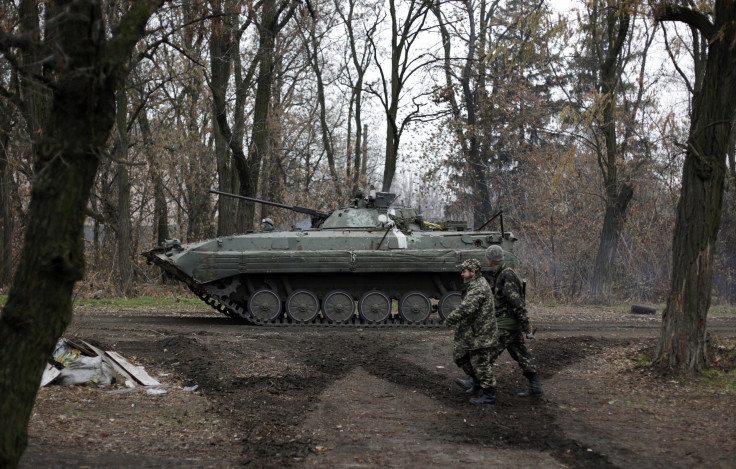US Congress Wants To Give Weapons To Ukraine To Fight Russia; Obama Hesitant To Pass Bill

President Barack Obama is expected to sign a bill this week that would provide up to $350 million worth of military aid to support the Ukrainian armed forces in its fight against Russian-backed separatists.
The bill, known as the Ukraine Freedom Support Act (full text here), passed unanimously in the Senate and the House last week. It will also include a number of economic and political measures, including further sanctions against financial and energy sector companies. But the bill also represents a clash of opinion between Congress and the White House on how to deal with Russia, with the latter raising concerns over some of the wording in the document, that it may derail ongoing talks with the Russian government.
“Overall, this will not be seen as a positive act in Russia, but the bill is also not as robust as it might have been,” said Steven Pifer, former U.S. ambassador to Ukraine between 1998 and 2000, in a phone interview. “And I think at the end of the day, the president will have little choice but to sign it because it was passed by such overwhelming numbers in the Senate and the House.”
The military aid, which the bill says is aimed at “re-establishing the sovereignty and territorial integrity of Ukraine,” is to include weapons, defense services, and training to the government of Ukraine over a three-year period.
Items in the bill include anti-tank and anti-armor weapons, other weapons and ammunition, counter-artillery radars, tactical troop-operated surveillance drones, and secure command and communications equipment. Within 60 days of the president authorizing the bill, he must present a list of the exact equipment that will be used.
But according to the White House Press Secretary Josh Earnest, the legislation -- introduced by Republican Senators Robert Menendez and Bob Corker -- sends a confusing message to Russia because “it includes some sanctions language that does not reflect the consultations that are ongoing." The last instance of the talks between Secretary of State John Kerry and Russian Foreign Minister Sergei Lavrov, on Sunday, was said to be positive.
While Obama does have the power to veto the law, Congress can override the veto with a two-thirds majority. One possible course of action for the president is to sign the bill and then choose not to act on it: “Most of the sanctions that the bill calls for say that the president “may,” not the president “shall” act on the legislation,” Pifer said. “So he’s authorized to do something if he wants, but [he's] not required to actually do it.”
Russia has already warned the U.S. about the bill last week, saying that it had an “openly confrontational nature” and amounted to “blackmail.”
However, it’s not all bad news for Russia. One crucial element of the bill is that it will now be easier for the administration to lift the current sanctions, as well as any additional sanctions that might be introduced.
“While [the bill] does call on the administration to impose new sanctions if Russia violates the Minsk agreement (on a ceasefire),” said Olga Oliker, senior international policy analyst at the RAND Corp., a Washington-based think tank, “it doesn’t preclude consulting with the Europeans, which will certainly have to happen, and it certainly doesn’t preclude lifting the sanctions. It just requires the president to certify that Russia has changed its behavior.” If that happens, sanctions can be lifted quickly.
The bill comes at a particularly taxing time for Russia’s economy, which has become increasingly fragile due to plummeting oil prices on top of current sanctions, imposed in March 2014 after Russia annexed Crimea from Ukraine. Problems came to a head Tuesday when the central bank of Russia, in an attempt to stop the ruble from collapsing further, raised interest rates from 10.5 percent to 17 percent, which failed to prevent the currency's fall to record lows against the dollar and euro.
© Copyright IBTimes 2024. All rights reserved.






















